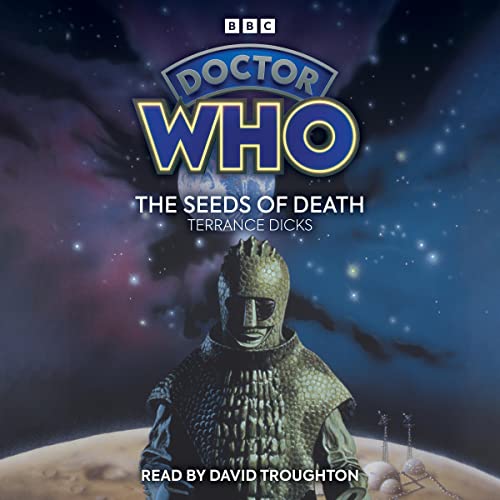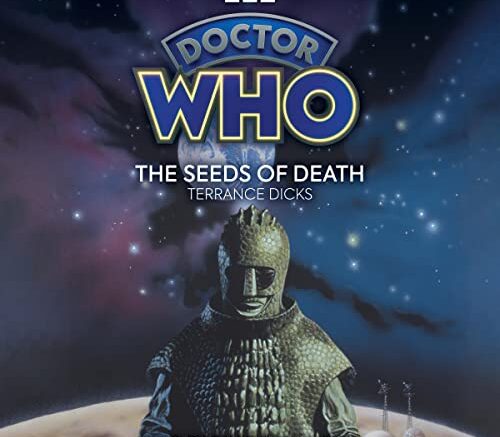
Audio: Audiobook: BBC
Written by: Terrance Dicks
Read by: Michael Troughton
The Seeds of Death in at its heart an interesting story that cautions against the adoption of flashy new technologies that stand on the shoulders of precisely nothing that’s gone before. It tells the tale of a future Earth where teleportation, known as T-Mat (short for the transmission of matter) is absolutely commonplace. All international trade is done by T-Mat, meaning no ships and no planes. Personal travel is done by T-Mat too. And T-Mat is run and regulated from the Moon.
There’s a line from a later era of Doctor Who, (Jon Pertwee’s The Time Warrior) in which Brigadier Lethbridge-Stewart says he’s putting all his eggs in one basket, and the Doctor quips that that’s fine – until someone steals the basket. That’s essentially the lesson of The Seeds of Death – when your entire world, its health and economies, depend on a single technology, what you create is a single point of weakness, which anyone with ill intent can attack.
He said, writing on a laptop connected to the internet, with almost no sense of irony.
The Difficult Second Story
But The Seeds of Death is more than just a standard Sixties parallel of technology and how it can be used for harm. It’s also the “difficult second story” for Brian Hayles’ Ice Warriors, who had left a lasting impression during their first outing.
And perhaps more than either of those things, for a lot of longstanding Who fans, The Seeds of Death, as one of the first Doctor Who stories released on VHS (Yes, stick with us, we’re ancient, VHS), it’s the first time a lot of fans who are at least nominally still alive will have encountered Patrick Troughton’s Doctor.
On screen, The Seeds of Death starts as a takeover of a single weak-point technology, and ramps up and up to a full-on invasion/takeover of the Earth, by, admittedly, a very small handful of Ice Warriors and their foamy seed pods that steal the oxygen out of the air, and ultimately can be used to change the climate of the Earth so it’s more friendly to the Ice Warriors than it is to humanity.
There is, again admittedly, a bit of a lull in the mid-section when the alternative to T-Mat is revived – standard rocketry, of the kind that, when the story went out, had finally taken Mankind to its own moon. Ironically, this rather proves the point of why T-Mat would be such a transformative technology, because it would save us all taking so lonnnnnnng to get from Point A (both physically and in storytelling terms) to Point B.
And there’s quite a bit of kerfuffle and chicanery by the Doctor towards the end, resulting in the Ice Warriors being outsmarted and sent, rather gruesomely, into a decaying orbit around, and eventually into, the sun.
The Rewrite of Death
Here’s the thing. Terrance Dicks, who was the show’s script editor at the time, famously rewrote episodes 3-6 of the story, because he felt Hayles’ version was “lacklustre and lacking in drama.”
There’s something horribly ironic about that, because it’s very much the second half of the transmitted version of the story that really starts to drag. But, as transmitted, there’s enough back-and-forth, panic, sacrifice, death, and Ice Warriors stomping around the place carrying seed pods to get you to the end, with only the transportation sections from the Earth to the moon really slowing down the pace.
It’s difficult to genuinely understand what happened when Dicks came to novelize the story, because the whole thing feels pedestrian, slow, and – much more than in the transmitted version, shows up the shortcomings of the story.
Daftest. Invasion Plan. Everrrr
First of all, and apologies for the spoiler alert, the seed pods that the Ice Warriors hope to use to change the climate on Earth…can be washed away with simple water.
Bear in mind that this was first and foremost broadcast in Britain, and the flaw in the plan becomes relatively obvious. Not only is the invasion stymied the first time it rains, but even in the hot countries, as soon as the weakness is known, water is relatively easy to come by on a planet like the Earth. So the Ice Warriors score highly on the “Most Rubbish Invasion Plan” scale of Sixties Doctor Who – and in the novelization, this rubbishness comes through much more clearly than it does on screen, where it has all the running around and panic to disguise it.
Secondly, the Ice Warriors double down on their rubbish invasion plan by having the bulk of their invasion fleet arriving in the final act, guided in by a single signal, and having only just about enough fuel on board to make it safely to the Earth.
That means when the Doctor sabotages the signal, they don’t have the fuel to pull themselves out of their sunny death-spiral. It’s cod, and convenient, and nothing like as clever as it appears on screen. And again, in the writing of the novelization, Terrance Dicks more or less writes it that way – plain, unvarnished, and not a little dull.
That’s an enormous surprise from Dicks, who, when enthused or inspired, could really make stories come alive. The Seeds of Death feels like a story he was content to let lie down and die on the page.
Death of the Ice Warriors
David Troughton, like his brother Michael (who has more frequently stepped into their father’s shoes as an audio Second Doctor) delivers a believable Second Doctor, as they all share a certain timbre that convinces. Other characters in the story are less convincing here, but it’s the story itself, as rendered by Dicks, that really drags down the pace and shows up the silliness of the whole affair.
It’s perhaps unsurprising that the next time the Ice Warriors were seen on screen in the main body of a story (perversely, also starring David Troughton, this time as a king), they had lost a lot of their villainous teeth and were more or less a decoy from the real villainy.
On the basis of this novelization, we wouldn’t be especially tempted to have them front and centre as a villain again either.
In a range that has some stellar standouts, The Seeds of Death audio novelization is an unfortunate lapse in standards that never rises much above a flatline in terms of excitement or drama. It is, when all is said and done, about the inconvenience of having rapid transit taken away from us – and what we end up with is an audiobook with the sparkle and charisma of a traffic jam.



Be the first to comment on "Doctor Who: The Seeds of Death"